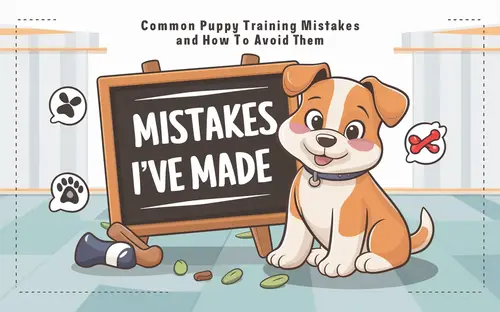Bringing home a new puppy is an exciting and joyful experience, but it also comes with the responsibility of proper training. While every puppy is unique, there are common mistakes that many owners make during the training process, which can lead to behavioral issues and frustration for both the puppy and the owner. In this comprehensive guide, we’ll explore some of the most prevalent puppy training mistakes and provide practical solutions to help you avoid them, ensuring a smoother journey toward raising a well-behaved and happy canine companion.
Delaying Training
The Importance of Early Training
One of the biggest mistakes new puppy owners make is delaying the training process. Many believe that puppies are too young to start learning or that training can wait until they’re a little older. However, this belief couldn’t be further from the truth. Puppies have an incredible capacity for learning from a very young age, and the earlier you start training, the better.
The Critical Socialization Period
During the critical socialization period, which typically occurs between 3 and 12 weeks of age, puppies are highly receptive to new experiences and lessons. This is the prime time to introduce them to positive training techniques, basic commands, and proper socialization with people, animals, and different environments.
Solution: Start Training Early
Delaying training not only misses this crucial developmental window but can also lead to the formation of undesirable behaviors that become increasingly difficult to correct as the puppy grows older. Start training as soon as you bring your puppy home. Begin with simple commands like “sit,” “stay,” and “come,” and use positive reinforcement techniques like treats and praise to encourage good behavior. Enroll your puppy in a reputable socialization class to help them become well-adjusted and comfortable in various situations.
Inconsistent Training
The Confusion of Mixed Signals
Consistency is key when it comes to puppy training. Puppies thrive on routine and clear expectations, and inconsistent training can quickly undo any progress you’ve made. This mistake often occurs when multiple family members are involved in the training process, each with their own methods and commands.
The Importance of Consistency
For example, if one person teaches the puppy to “sit” using a hand signal and a treat, while another simply uses a verbal cue, the puppy will become confused and struggle to understand what is expected of them. Similarly, if some family members allow the puppy on the couch while others discourage it, the mixed messages can undermine the training efforts.
Solution: Establish a Consistent Training Plan
To avoid this mistake, establish a consistent training plan and ensure that all family members involved in the training process are on the same page. Agree on a set of commands, hand signals, and reward systems, and use them consistently throughout the training process. Additionally, establish clear rules and boundaries for the puppy’s behavior, and ensure that everyone in the household enforces them consistently.
Lack of Patience and Positive Reinforcement
The Pitfalls of Punishment
Training a puppy requires patience, consistency, and a positive approach. Unfortunately, many owners become frustrated when their puppy doesn’t quickly grasp a new command or exhibits undesirable behavior. This frustration can lead to harsh reprimands, yelling, or even physical punishment, which can be counterproductive and damaging to the puppy’s development and trust in their owners.
The Benefits of Positive Reinforcement
Puppies learn best through positive reinforcement, which involves rewarding desirable behaviors with treats, praise, or other rewards. Positive reinforcement not only encourages good behavior but also strengthens the bond between the puppy and their owner.
Solution: Embrace Patience and Positive Reinforcement
Embrace a patient and positive approach to training. Understand that puppies have short attention spans and may take longer to learn certain commands or behaviors. Break training sessions into short, frequent intervals to keep the puppy engaged and motivated. Use high-value treats, praise, and positive reinforcement to reward progress, no matter how small. If you find yourself becoming frustrated, take a break and try again later when you’re feeling more patient and calm.
Inadequate Socialization
The Consequences of Limited Socialization
Proper socialization is crucial for raising a well-adjusted, confident, and friendly puppy. Puppies that are not exposed to a variety of people, animals, sights, and sounds during their critical socialization period (3 to 12 weeks of age) may develop fear, anxiety, or aggression toward unfamiliar situations.
The Critical Socialization Period (Revisited)
Many owners make the mistake of keeping their puppies isolated or limiting their socialization experiences, thinking they are protecting them. However, this approach can backfire, leading to behavioral issues that can be challenging to correct later on.
Solution: Prioritize Socialization
Make socialization a priority from the moment you bring your puppy home. Enroll them in puppy socialization classes, where they can safely interact with other puppies and people under the guidance of a professional trainer. Gradually expose them to different environments, such as parks, pet-friendly stores, and city streets, taking care to ensure that these experiences are positive and non-threatening.
Introduce your puppy to various sights, sounds, and textures, like vacuum cleaners, loud noises, and different floor surfaces. Remember to go at your puppy’s pace and never force them into situations that cause them excessive stress or fear.
Overtraining or Unrealistic Expectations
The Importance of Balance
While training is essential for raising a well-behaved puppy, it’s important to strike a balance and avoid overtraining or setting unrealistic expectations. Puppies have limited attention spans and can quickly become overwhelmed or bored if training sessions are too long or too demanding.
Setting Realistic Goals
Some owners make the mistake of expecting their puppies to learn and retain complex commands or behaviors too quickly, leading to frustration for both the owner and the puppy. It’s important to remember that puppies are still developing, and their ability to learn and retain information will improve with age and consistent training.
Solution: Keep Training Sessions Short and Fun
Keep training sessions short and frequent, typically lasting no more than 5 to 10 minutes for young puppies. Focus on mastering one command or behavior at a time, and gradually introduce new skills as your puppy progresses. Set realistic goals based on your puppy’s age and developmental stage, and celebrate even small achievements along the way.
Additionally, ensure that training sessions are fun and engaging for your puppy. Use a variety of rewards, such as treats, toys, and praise, to keep them motivated and interested.
Failing to Provide Mental and Physical Stimulation
The Needs of an Active Puppy
Puppies are energetic, curious, and highly active, and failure to provide adequate mental and physical stimulation can lead to a host of behavioral issues, such as destructive chewing, excessive barking, and hyperactivity. Many owners make the mistake of assuming that a daily walk or playtime in the backyard is sufficient for their puppy’s needs.
The Importance of Mental Enrichment
However, puppies require more than just physical exercise; they also need mental stimulation to prevent boredom and unwanted behaviors. A bored puppy is more likely to engage in destructive behaviors as a way to release pent-up energy and satisfy their natural curiosity.
Solution: Provide Interactive Toys and Activities
In addition to regular exercise, incorporate interactive toys and puzzles that challenge your puppy’s mind and provide mental stimulation. Rotate different toys and activities to keep things interesting and prevent boredom. Consider enrolling your puppy in obedience classes or participating in dog sports like agility or nose work, which provide both physical and mental enrichment.
Training sessions themselves can also serve as a form of mental exercise, challenging your puppy to learn new skills and commands. Provide plenty of opportunities for safe, supervised exploration and playtime, allowing your puppy to investigate new sights, sounds, and textures in a controlled environment.
Neglecting Basic Needs
The Importance of Proper Nutrition
While training and socialization are essential components of raising a well-behaved puppy, it’s crucial not to overlook their basic needs for proper nutrition, rest, and healthcare. Puppies have specific dietary requirements and sleep patterns that, if neglected, can lead to behavioral issues and health problems.
Some owners make the mistake of free-feeding their puppies, allowing them to graze throughout the day, which can contribute to overeating, obesity, and digestive issues.
The Importance of Rest and Healthcare
Others may unknowingly deprive their puppies of adequate rest by disrupting their sleep or failing to provide a quiet, comfortable space for them to retreat to when needed. Regular veterinary check-ups and preventative care, such as vaccinations and parasite control, are also crucial for maintaining your puppy’s overall health and well-being.
Solution: Attend to Basic Needs
Consult with your veterinarian to ensure that your puppy is receiving a balanced, age-appropriate diet and is on a proper feeding schedule. Provide a consistent sleeping area and establish a routine that allows for adequate rest and downtime. Stay up-to-date with your puppy’s veterinary care, including regular check-ups, vaccinations, and preventative treatments.
Conclusion
Raising a well-behaved puppy is a rewarding but challenging journey that requires patience, consistency, and a commitment to avoiding common training pitfalls. By starting training early, maintaining consistency across all family members, embracing positive reinforcement techniques, prioritizing socialization, setting realistic expectations, providing mental and physical stimulation, and attending to your puppy’s basic needs, you can lay a solid foundation for a lifetime of companionship with a well-adjusted, obedient, and happy furry friend.
Remember, every puppy is unique, and training is an ongoing process that requires patience, understanding, and a willingness to adapt your approach as needed. Seek guidance from experienced trainers or professionals if you encounter challenges or have specific concerns about your puppy’s behavior or development.
With dedication and the right approach, you can navigate the puppy training journey successfully, avoiding common mistakes and creating a strong bond with your canine companion.
File size
FAQs
- When is the best time to start training a puppy?
The best time to start training a puppy is as soon as you bring them home, typically between 8-10 weeks of age. This early training period is crucial for establishing good habits and taking advantage of the critical socialization window. - How long should puppy training sessions last?
Puppy training sessions should be kept short and frequent, typically lasting no more than 5-10 minutes for young puppies. Their attention spans are limited, and longer sessions can lead to frustration and a lack of engagement. - Is it better to use treats or praise as rewards during training?
Both treats and praise can be effective rewards during training, but it’s generally recommended to use a combination of the two. Treats are a powerful motivator, while praise helps to reinforce the bond between you and your puppy. - How important is socialization for a puppy?
Socialization is crucial for raising a well-adjusted and confident puppy. Puppies that are not properly socialized during their critical socialization period (3-12 weeks) may develop fear, anxiety, or aggression toward unfamiliar situations. - What should I do if my puppy becomes frustrated or disinterested during training sessions?
If your puppy becomes visibly frustrated or disinterested during a training session, it’s best to end the session on a positive note and try again later. Forcing a puppy to continue training when they are no longer engaged can lead to negative associations and make future sessions more difficult.








